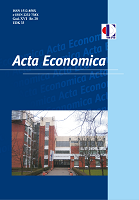КЉУЧНЕ ДИМЕНЗИЈЕ КВАЛИТЕТА ЗАПОСЛЕНОСТИ У СРБИЈИ
KEY DIMENSIONS OF THE QUALITY OF EMPLOYMENT IN SERBIA
Author(s): Dejan S. Molnar, Maja JandrićSubject(s): Labor relations, Labour and Social Security Law
Published by: Економски факултет Универзитета у Бањој Луци
Keywords: labour market; flexibility; security; quality of employment; EPL index; EU; Serbia;
Summary/Abstract: Labour market in the Republic of Serbia has been subject to various macroeconomic shocks and institutional changes since the beginning of 2000. The main motivation for institutional reforms oriented towards less strict employment protection legislation was fostering efficiency and improving labour market performances. However, despite a large number of theoretical and empirical research examining how labour market flexibility affects employment and unemployment rates, as well as other indicators of labour market performances, the results still do not provide clear and firm confirmation of the hypothesis that a more flexible labour market (in terms of external numerical flexibility) will inevitably lead to higher employment rates. Institutional framework did not provide more labour market security that would compensate for the rise of external numerical flexibility. Data on key labour market indicators indicate significant recovery since 2012. However, even though employment rate has risen, problems with the quality of employment still exist. Likewise, it is also important to note that despite the improvement in the labour market in the previous period, the main indicators – activity rate, employment rate and unemployment rate in Serbia in 2016 were still below the EU-28 levels. The rate of informal employment is high and it is accompanied by high shares of different forms of temporary employment and vulnerable employment. The share of employed workers who have problems with being entitled to basic employment rights is not negligible: about 9% of employees have difficulties in exercising the right to health and pension insurance, whereas about 13% of employees have problems with exercising the right to paid vacation and sick leave. At the same time, perceived employment security in Serbia is lower than in the EU-28. High subjective sense of insecurity in the labour market has also been confirmed by the objective data on the labour market transitions to lower levels of security. The share of low wage earners is higher than in most European countries. Considering participation in the lifelong learning programmes, whose importance and benefits are widely recognized, the share of persons who actually participate in trainings and other programmes is not sufficiently high. In the era of major technological changes, the lack of continuous improvement of knowledge and skills might lead to greater structural problems in the future.
Journal: Acta Economica
- Issue Year: 16/2018
- Issue No: 28
- Page Range: 73-95
- Page Count: 23
- Language: Serbian

